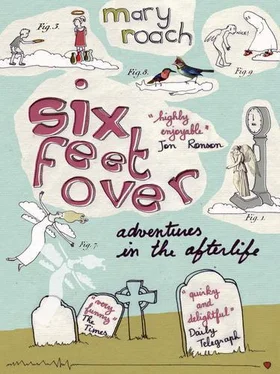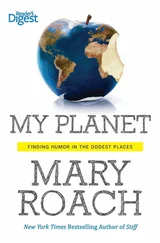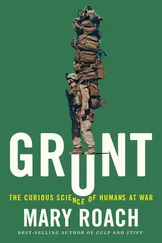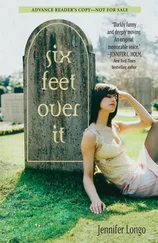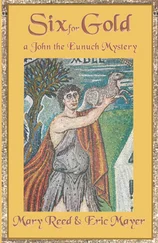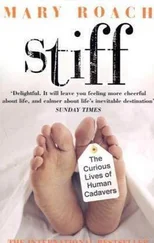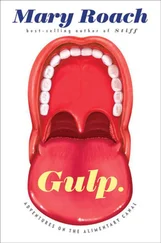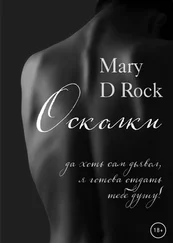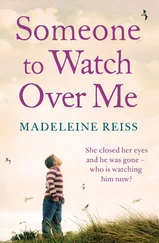Mary Roach
SIX FEET OVER
Adventures in the Afterlife
FOR MY PARENTS,
WHEREVER THEY ARE OR AREN’T

MY MOTHER worked hard to instill faith in me. She sent me to catechism classes. She bought me nun paper dolls, as though the meager fun of swapping a Carmelite wimple for a Benedictine chest bib might inspire a taste for devotion. Most memorably, she read me the Bible. Every night at bedtime, she’d plow through a chapter or two, handing over the book at appropriate moments to show me the color reproductions of parables and miracles. The crumbling walls of Jericho. Jesus walking atop stormy seas with palms upturned. The raising of Lazarus—depicted in my mother’s Bible as a sort of Boris Karloff knockoff, wrapped in mummy’s rags and rising stiffly from the waist. I could not believe these things had happened, because another god, the god who wore lab glasses and knew how to use a slide rule, wanted to know how, scientifically speaking, these things could be possible. Faith did not take, because science kept putting it on the spot. Did the horns make the walls fall, or did there happen to be an earthquake while the priests were trumpeting? Was it possible Jesus was making use of an offshore atoll, the tops of which sometimes lie just inches below the water’s surface? Was Lazarus a simple case of premature entombment? I wasn’t saying these things didn’t happen. I was just saying I’d feel better with some proof.
Of course, science doesn’t dependably deliver truths. It is as fallible as the men and women who undertake it. Science has the answer to every question that can be asked. However, science reserves the right to change that answer should additional data become available. Science first betrayed me in the early eighties, when I learned that brontosaurus had lived in a sere, rocky desert setting. The junior science books of my childhood had shown brontosaurs hip-deep in brackish waters, swamp greens dangling from the sides of their mouths. They’d shown tyrannosaurs standing erect as socialites and lumbering Godzilla-slow, when in reality, we were later told, they had sprinted like roadrunners, back flat and tail aloft. Science has had us buying into the therapeutic benefits of bloodletting, of treating melancholy with arsenic and epilepsy with goose droppings. It’s not all that much different today: Hormone replacement therapy went from miracle to scourge literally overnight. Fats wore the Demon Nutrient mantle for fifteen years, then without warning passed it to carbohydrates. I used to write a short column called “Second Opinion,” for which I scanned the medical literature, looking for studies that documented, say, the health benefits of charred meat or the deleterious effects of aloe on wound-healing. It was never hard to fill it.
Flawed as it is, science remains the most solid god I’ve got. And so I decided to turn to it, to see what it had to say on the topic of life after death. Because I know what religion says, and it perplexes me. It doesn’t deliver a single, coherent, scientifically sensible or provable scenario. Religion says that your soul goes to heaven or possibly to a seven-tiered garden, or that your soul is reincarnated into a new body, or that you lie around in your coffin clothes until the Second Coming. And, of course, only one of these can be true. Which means that for millions of people, religion will turn out to have been a bum steer as regards the hereafter. Science seemed the better bet.
For the most part, science has this to say: Yeah, right . If there were a soul, an etheric disembodied you that can live on, independent of your brain, we scientists would know about it. In the words of the late Francis Crick, codiscoverer of the structure of DNA and author of The Astonishing Hypothesis: The Scientific Search for the Soul , “You, your joys and your sorrows, your memories and your ambitions, your sense of personal identity and free will, are in fact no more than the behavior of a vast assembly of nerve cells and their associated molecules.”
But can you prove that, Dr. Crick? If not, then it’s no more good to me than the proclamations of God in the Old Testament. It’s just the opinion, however learned, of one more white-haired, all-knowing geezer. What I’m after is proof. Or evidence, anyway—evidence that some form of disembodied consciousness persists when the body closes up shop. Or doesn’t persist.
Proof is a tremendously comforting thing. When I was little, I used to worry that one day, without warning, the invisible forces that held me to the earth were going to conk out, and that I would drift up into space like a party balloon, rising and rising until I froze or exploded or suffocated or all three at once. Then I learned about gravity, the dependable pull of the very large upon the very small. I learned that it had been scientifically proven to exist, and I no longer worried about floating away. I worried instead about blackheads and whether Pat Stone dreamed of me and other dilemmas for which science could provide no succor.
It would be especially comforting to believe that I have the answer to the question, What happens when we die? Does the light just go out and that’s that—the million-year nap? Or will some part of my personality, my me-ness, persist? What will that feel like? What will I do all day? Is there a place to plug in my laptop?
Most of the projects that I will be covering have been—or are being—undertaken by science. By that I mean people doing research using scientific methods, preferably at respected universities or institutions. Technology gets a shot, as does the law. I’m not interested in philosophical debates on the soul (probably because I can’t understand them). Nor am I going to be relating anecdotal accounts of personal spiritual experiences. Anecdotes are interesting, occasionally riveting, but never are they proof. On the other hand, this is not a debunking book. Skeptics and debunkers provide a needed service in this area, but their work more or less assumes an outcome. I’m trying hard not to make assumptions, not to have an agenda.
Simply put, this is a book for people who would like very much to believe in a soul and in an afterlife for it to hang around in, but who have trouble accepting these things on faith. It’s a giggly, random, utterly earthbound assault on our most ponderous unanswered question. It’s spirituality treated like crop science. If you found this book in the New Age section of your local bookstore, it was grossly misshelved, and you should put it down at once. If you found it while browsing Gardening, or Boats & Ships, it was also misshelved, but you might enjoy it anyway.
AUGUST 6, 1978, was a Sunday, the Feast of the Transfiguration. It was evening, and Pope Paul VI lay dying in his bedroom. With him was his doctor and two of his secretaries, Monsignor Pasquale Macchi and Father John Magee. At 9:40 p.m., following a massive heart attack, His Holiness expired. At that very moment, the alarm clock on his bedside table rang out. Accounts of this episode refer to the timepiece as the Pope’s “beloved Polish alarm clock.” He bought it in Warsaw in 1924 and carried it with him in his travels from then on. He seemed to be fond of it in the way that farmers are fond of old, slow- moving dogs, or children of their blankets. Every day, including the day he died, the alarm was set for 6:30 a.m.
I first came upon this story in a gullible and breathless compilation of supposed evidence for the afterlife. I don’t recall the book’s title (though the title of the chapter about spirit communication—“Intercourse with the Dead”—seems to have stayed with me). The book presented the story of the pontiff’s noisy passing as proof that some vestige of His Holiness’s spirit influenced the papal clockworks [1] A modern corollary to the Pope’s alarm clock can be found in the erratic behavior of a digital alarm clock belonging to a Mrs. Linda G. Russek, of Boca Raton, Florida. Russek’s husband Henry had recently died, and she wondered whether he was trying to communicate with her via the clock. Russek, a parapsychologist, undertook an experiment in which she asked Henry to speed the clock up on even days and slow it down on odd days. Alas, the data were meaningless because shortly after the study began, the AM/PM indicator had gone on the blink, and Russek was unable to definitively conclude anything beyond the fact that she needed a new alarm clock.
Читать дальше
